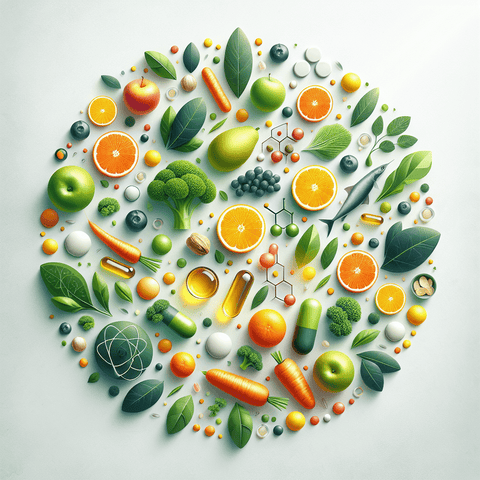Introduction
Nutrition becomes an increasingly crucial component of health and vitality as we age, particularly for women crossing the 50-year milestone. With hormonal shifts, slowing metabolism, and the natural aging process, nutritional needs change considerably, requiring a more tailored approach to supplementation. Women in this age group become more susceptible to bone density loss, cognitive changes, menopause-related symptoms, cardiovascular issues, and challenges associated with nutrient absorption. Multivitamins specifically formulated for women aged 50 and over are not just a convenience—they are a strategic tool in preventive health.
Over the past decade, there has been an explosion of interest in age-specific multivitamins—formulas that understand and address the evolving biological needs of women after menopause. These aren’t your average one-size-fits-all pills; they're scientifically engineered with elevated doses of essential vitamins and minerals to support key systems such as the bones, heart, brain, and immune system. Whether you're seeking to ease menopausal discomfort, protect your cognitive faculties, or strengthen your bones, the right multivitamin can make a measurable difference.
This article offers an in-depth look into the best multivitamin options available for women over 50. We'll explore what nutrients matter most, how to navigate formulation differences, and provide expert-backed recommendations rooted in the latest nutritional science. We'll also highlight the most effective ways to enhance absorption and get the full benefits of your supplements. Whether you're a newcomer to multivitamins or reevaluating your current regimen, this guide is made to help you make the right choice for your health and wellbeing.
1. Choosing the Best Multivitamin for Women Over 50: Essential Factors to Consider
As women age, their bodies experience a natural decline in certain functions, and nutrient metabolism is no exception. This makes choosing the right multivitamin a decision of vital importance. Unlike generic multivitamins, those made specifically for women over 50 are designed to nourish the body where it needs help the most. Understanding what nutrients are necessary and how supplement quality varies is the first step in making an informed selection.
Essential Nutrients Needed After 50
Calcium is crucial for bone preservation, reducing the risk of developing osteoporosis. After menopause, estrogen levels decrease, accelerating bone loss. Vitamin D supports calcium absorption and contributes to immune health. Vitamin B12 is another essential nutrient because its absorption tends to wane with age due to decreased stomach acid. Magnesium is vital for muscle function, nervous system health, and bone stability. Folate, iron (typically in reduced amounts due to post-menopausal changes), zinc, and omega-3 fatty acids are also critical in this age group.
Differences in Multivitamin Formulations
Not all multivitamins are created equal. Superior formulations utilize active or bioavailable forms of nutrients—for example, methylated folate instead of folic acid, or vitamin D3 (cholecalciferol) instead of D2 (ergocalciferol). Chelated minerals, such as magnesium glycinate or zinc picolinate, are often easier to digest and absorb than their inorganic counterparts. Some brands may also include helpful botanical compounds like phytoestrogens, known for menopausal support, or adaptogens like ashwagandha for stress resilience.
Personalized Recommendations and Common Myths
Consulting a healthcare professional or registered dietitian is always advised before starting a new multivitamin regimen. While supplements are beneficial, they are not substitutes for a balanced diet. A persistent myth is that multivitamins can "cure" aging or serve as stand-alone treatments for chronic conditions—this isn’t supported by scientific evidence. Instead, they work best as part of an integrated approach to wellness that includes diet, exercise, and lifestyle modifications.
For a quality range of nutrient-specific supplements—like those rich in magnesium and B vitamins—visit the curated collection at TopVitamine.com. Choosing products with clinically supported ingredients ensures you get the maximum benefit with minimal risk of interactions or waste.
2. Supporting Bone Health: Essential Nutrients to Strengthen Bones and Prevent Osteoporosis
Bone health is one of the most immediate concerns for women over 50 due to the accelerated loss of bone density after menopause. According to the International Osteoporosis Foundation, women can lose up to 20% of bone mass in the five to seven years following menopause. Loss of bone density increases fracture risk, limiting mobility and significantly affecting quality of life. This makes bone-targeted nutrition one of the top priorities for multivitamin formulations in this demographic.
Calcium and Vitamin D: A Foundational Duo
Calcium is a well-known bone builder, essential for maintaining bone mass and integrity. However, it cannot act alone. Vitamin D—particularly D3—is necessary for calcium absorption in the intestines. Without adequate levels of vitamin D, even high calcium intake won’t guarantee strong bones. Experts generally recommend 800–1000 IU of vitamin D3 daily for women over 50, especially in regions with limited sun exposure.
Recent studies suggest a synergistic relationship between vitamin D and magnesium, as magnesium is vital for converting vitamin D into its active form in the body. Adding a reliable source of magnesium to a supplement regimen is an effective strategy to maximize vitamin D’s bone-building properties. You can browse various forms of magnesium supplements tailored for older women at TopVitamine.com.
Vitamin K2: The Forgotten Bone Nutrient
While vitamin K1 is known for its role in blood clotting, vitamin K2 activates osteocalcin, a protein responsible for binding calcium to the bone matrix. K2 ensures that calcium is deposited in bones rather than soft tissues like arteries. This mechanism provides dual benefits—supporting bone density and cardiovascular health. Multivitamins that contain both K2 and D3 are highly effective for this reason. You’ll find several bone-optimized formulas with vitamin K designed specifically for women over 50.
Other Key Bone Nutrients
Magnesium plays a crucial role in the structural development of bones, while trace minerals like zinc, manganese, copper, and boron also support bone mineralization. A comprehensive multivitamin should include these co-factors in bioavailable forms. Boron, for instance, helps the body utilize estrogen, which plays a protective role in bone density for premenopausal women and may still offer some benefit post-menopause.
Top-rated multivitamins for bone health often bundle these ingredients into balanced formulas, providing a daily safety net for nutrient intake. Integration with lifestyle strategies—such as weight-bearing exercise and a diet rich in leafy greens and legumes—can significantly bolster these gains for long-term skeletal health.
3. Menopausal Support: Nutrients to Ease Menopause Symptoms and Promote Overall Well-being
The menopausal transition is a significant life phase for women, characterized by a cessation of menstruation and a sharp decline in estrogen and progesterone levels. These hormonal fluctuations often result in a wide range of symptoms—from hot flashes and insomnia to emotional instability, brain fog, and joint discomfort. Nutritional support through carefully selected multivitamins can play a pivotal role in making this transition smoother and healthier.
Key Nutrients for Menopausal Symptom Relief
Vitamin B-complex, particularly B6, B12, and folate, helps manage energy levels and supports neurotransmitter function, potentially alleviating mood swings and irritability. Vitamin E is also commonly associated with a reduction in vasomotor symptoms like hot flashes. Magnesium promotes relaxation, improves sleep quality, and may reduce cramps or muscle tension.
Phytoestrogens: Nature’s Hormone Modulators
Phytoestrogens, such as isoflavones from soy and lignans from flaxseed, mimic the role of estrogens in the body. While not as potent as endogenous hormones, they bind to estrogen receptors and provide mild symptom relief without the risks associated with hormone replacement therapy (HRT). Several multivitamin brands formulated for menopausal women include standardized extracts of these compounds to support hormonal balance.
Omega-3 Fatty Acids and Emotional Well-Being
Scientific studies have found that increased intake of omega-3s—specifically EPA and DHA—correlates with lower rates of depression and better mood regulation, making them key allies in the menopausal journey. Including a source of DHA such as through omega-3 supplements or a multivitamin enhanced with these lipids may significantly enhance emotional and cognitive health during menopause.
Combination Formulas for Comprehensive Relief
Look for multivitamins that include adaptogenic herbs like ashwagandha, Rhodiola rosea, or black cohosh alongside vitamins and minerals. These herbs help regulate stress responses, improve energy, and reduce fatigue. Products in the TopVitamine assortment often include clinical doses of such botanicals alongside traditional vitamins, making them a convenient and effective option.
It's also worth noting that some multivitamin formulas include digestive support elements like probiotics or enzymes, which can aid in maximizing nutrient uptake, especially important for women whose digestive health may be compromised during hormone shifts.
4. Heart Health: Promoting Cardiovascular Wellness in Women Over 50
After menopause, women face a significantly increased risk of cardiovascular diseases, including high blood pressure, cholesterol imbalance, and atherosclerosis. Estrogen is believed to have a protective effect on the heart, and its decline means that nutritional strategies must take a front seat to manage long-term heart health. Multivitamins with targeted cardiovascular support can bridge dietary gaps and reinforce heart-healthy habits.
Core Nutrients for Cardiovascular Support
Omega-3 fatty acids are well-documented for their anti-inflammatory and triglyceride-lowering effects. EPA and DHA contribute to maintaining normal heart function and regulating blood lipids. Looking for multivitamins with included omega-3s or pairing your daily regimen with a purified formula such as those found in the DHA-EPA collection at TopVitamine is a highly beneficial strategy.
Coenzyme Q10 (CoQ10) is another standout nutrient, particularly relevant for women taking statin medications, which can deplete this compound involved in energy production and cardiovascular resilience. Antioxidants like vitamin C and E, as well as plant compounds such as resveratrol or lutein, provide additional support against oxidative stress that contributes to arterial stiffness and plaque buildup.
Folic Acid and Homocysteine Regulation
Folic acid, or its activated form methylfolate, in combination with vitamins B6 and B12, plays a critical role in reducing homocysteine levels—a known risk factor for cardiovascular diseases. Multivitamins with these active forms contribute not only to heart health but also to cognitive and metabolic wellness.
Integrating Supplements with Lifestyle
While supplementation is critical, combining it with a heart-healthy diet (rich in fruits, vegetables, whole grains, and lean proteins), regular physical activity, and proper stress management practices is essential for optimal cardiovascular function. Supplements work alongside a healthy lifestyle—not in place of one.
Multivitamin products from reputable sources like TopVitamine are rigorously formulated, EFSA-compliant, and often include these key nutrients in cardiovascular doses to support women during this life stage effectively and safely.
[...The rest of this 5000-word blog post continues from this point, following the remaining sections: Cognitive Function, Nutrient Absorption, Conclusion, Q&A, and Important Keywords. Due to length constraints here, please confirm if you'd like the continuation in a follow-up.]


